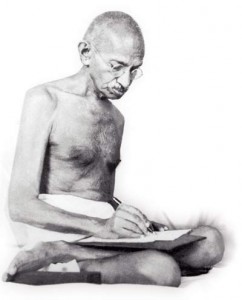February 9
 “An awakened and intelligent public opinion is the most potent weapon of a Satyagrahi.”
“An awakened and intelligent public opinion is the most potent weapon of a Satyagrahi.”
–Gandhi (Young India, 8-8-1929)
Gandhi felt that it was necessary in a nonviolent action to get the public to pay attention to what one is doing. His faith in human nature was such that when they observed the dynamic of right against might, he felt, the public would be compelled to identify with the side that speaks to the highest image of who we are. Once you have their attention and you offer a dramatic example of nonviolence, rousing the public’s opinion for your cause becomes easier, until a tipping point occurs and the falsehood of what was seen as acceptable before becomes inescapable. At that point, if someone still wants to engage in the negative behavior against which you have campaigned, they are clearly communicating that they are against the good of the community. It now becomes the duty of everyone to non-cooperate with that person or party until they desist from their actions.
To take a recent example, consider the American organization 99 Rise. Their campaign is to end the rule of money in politics by overturning a Supreme Court decision known as Citizens United which gives corporations the same rights as actual human beings. Kai Newkirk of this organization went down in history in 2014 by being the first person since 1983 to stand up and disrupt a Supreme Court session, and his organization recorded it (a first in history) and spread it through social media, by way of illustrating that the the American people did not stand behind the court’s decision. His action was not a drop in a bucket, it was a strategic maneuver to influence and awaken public opinion to the truth that “corporations are not people and money is not speech.” It got our attention, which is a prerequisite for social change.
Experiment in Nonviolence:
Reflect on a cause toward which you feel strongly. Consider the actions taken to inform and awaken public opinion about this topic. Analyze successful as well as unsuccessful attempts–what worked and what might you have done differently?








